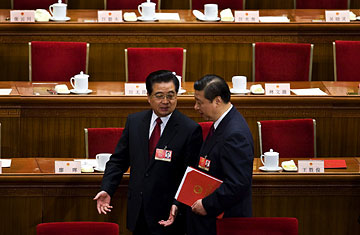
Chinese President Hu Jintao, left, chats with Vice President Xi Jinping on March 13, 2009 as they leave the Great Hall of the People after the closing ceremony of the National People's Congress in Beijing
It's not often the proceedings of the Communist Party of China resemble a detective story, but the Fourth Plenum of the 17th Congress, which just concluded in Beijing, fits the bill perfectly. In fact, the Plenum, the Party's biggest annual meeting at which major policy and personnel decisions are made, is being compared to the Sherlock Homes storyline in which the most significant clue is something that did not occur — the guard dog that didn't bark on the night of the murder. At the characteristically secretive Plenum, the equivalent clue into the mystery of who will be China's next leader was the fact that Xi Jinping, the man widely touted as the most likely successor to President Hu Jintao, was not appointed deputy chairman of the Military Commission.
For the past five years, Hu has headed the Commission, a critical lever of power in China through which the Party controls the country's armed forces. Promotion to its vice chairmanship is widely seen as an essential step in the opaque process by which the Party selects its next leader. Critically, Hu's appointment to the same job was announced at the Plenum held three years before he ascended to the General Secretaryship of the Party in 2002. Because previous head-of-state successions have essentially been orchestrated by dominant leaders like Mao Zedong and Deng Xiaoping, Hu's path to power is the only precedent Chinawatchers — and, indeed, middle and lower level Party members — have to make judgments about the process. Until now, Xi, China's current vice president, has received the same titles at the same point in time as Hu. Xi's failure to get the Military Commission job last week has sparked a heated debate among Sinologists about his future — and the possibility of both a factional struggle and other candidates vying for the top job. Hu is widely expected to step down as General Secretary of the Party — and of course President of China, the job that goes with it — in 2012, having served two five year terms.
Much of the speculation over why Xi was not promoted has centered around the military itself, and the possibility that senior generals in the People's Liberation Army (PLA) may have vetoed or delayed his appointment. Xi's lack of concrete relations with senior military figures, as well as an absence of credentials showing that he would support more large increases in military expenditure, are usually cited as reasons for not being backed by the PLA. But other analysts argue that the cause probably lay in a broader factional divide in the Party that pits supporters of Hu and Premier Wen Jiabao against the so-called Princelings, children of Party elders and an allied group dubbed the Shanghai Gang, which coalesced around Hu's predecessor Jiang Zemin.
The sudden flurry of conversation about Xi and his future underscores both how little is known about the inner workings of the Party and the fact the Party itself is struggling to adapt to the blinding speed at which China's society and economy are changing. That fact was acknowledged in the otherwise content-free and jargon-laden Communiqué issued at the close of the Plenum. According to the official Xinhua news agency, the Communiqué stated that "many problems exist inside the Party that run counter to new circumstances and the Party's character, which 'are severely weakening the Party's creativity, unity and effectiveness in dealing with these problems'... and 'severely' harming the ties of flesh and blood between the Party and people and the strengthening of the Party's rule."
"The succession is not a done deal by any means," says Beijing-based analyst Russell Leigh Moses. "Not every succession process in China goes exactly as planned." In fact, the uproar surrounding Xi's non-appointment may well be overblown anyway, Moses argues, noting that senior Party officials are still trying to put in place concrete rules on succession and other procedures. "They all agree that there is a problem but they can't agree on how exactly to fix it or where to start," Moses says. "I don't see any signs of impatience inside the Party on this issue, though if it's still unresolved in a year, that would be significant." Stay tuned for China's next earthshaking non-event.
